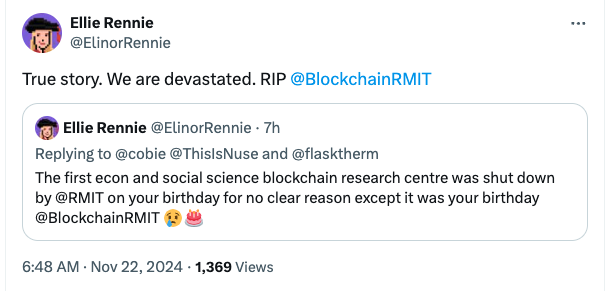RMIT Blockchain Innovation Hub faces an uncertain future after reports of its closure, though no final decision has been made.

Despite a ferocious crypto market rally, the future of the blockchain research institute at an Australian university is dubious. According to a professor on X, the institute has been “shut down.”
“The first econ and social science blockchain research center was shut down by RMIT,” RMIT Blockchain Innovation Hub member Professor Ellie Rennie said in a Nov. 22 X post, adding there was “no clear reason” why.
However, Professor Jason Potts, the institute’s co-director and Rennie’s husband, informed Cointelegraph that the situation is “fluid” and that there has been “no decision” made regarding its closure.
“It was my understanding that yesterday the Blockchain Hub was being shut down,” Rennie told Cointelegraph, walking back her earlier posts on X. “Today, there are now ongoing discussions.”

How RMIT Blockchain Hub can Survive
Potts would be required to present a viable solution to finance the Hub in order for it to survive, as RMIT’s procedure necessitates a one-week consultation with staff, according to individuals with knowledge of the matter who spoke with Cointelegraph.
They stated that the center, which was established in 2017, has not generated sufficient high-quality research to secure sufficient funding to be self-sustaining.
The research center’s closure is currently under consideration by RMIT, which coincides with the cryptocurrency’s resurgence in the public eye.
Bitcoin has rocketed 45% to nearly $100,000 after Donald Trump’s election win, who promised to overhaul crypto regulations in the United States.
A person familiar with the situation, given anonymity to discuss the matter, said Potts and co-founder Professor Chris Berg had repeatedly told staff that the Hub is “an experiment.”
Potts, in particular, said the Hub aimed to develop “a new type of business school” where academics were expected to be “industry-engaged and entrepreneurial” and that getting published in top-tier journals — important for a university’s clout and getting research funded — “was a secondary consideration,” the person said.
“We were told the university wanted us to rapidly gain a reputation in the blockchain space that it could then leverage to gain students and industry relevance,” the person said. They added it explained the argument as to why the Hub couldn’t fit into “standard university procedures.”
Professor Colin Picker, RMIT’s Deputy Vice-Chancellor of Business, is expected to make the final decision regarding the Hub’s closure.
Regulators in numerous countries worldwide consult the United States, the world’s largest economy with its foremost financial hub, New York City, as a model for regulating their respective markets.
Trump’s victory has altered the way people view cryptocurrency. He has declared the United States to be “the world capital of crypto” and has pledged to regulate the Securities and Exchange Commission, which has initiated numerous lawsuits against local industry participants. The current Chair of the Commission is expected to resign upon Trump’s inauguration.
A Senate inquiry conducted last year revealed that Australia regulates cryptocurrency under its existing financial laws.
